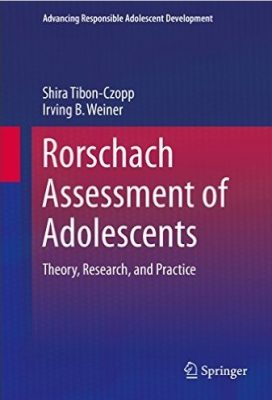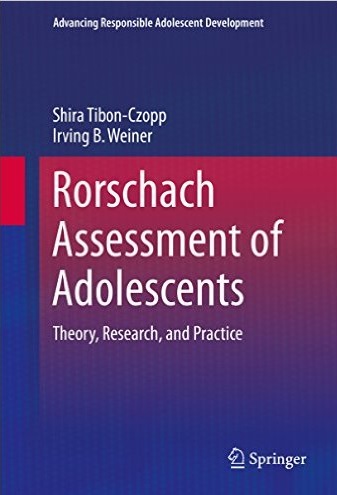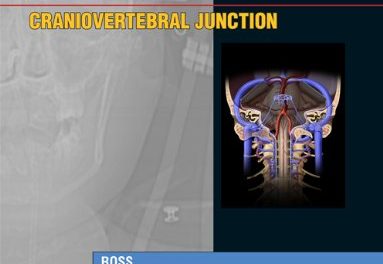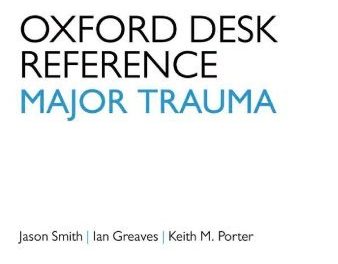 (Part of the Advancing Responsible Adolescent Development series)
(Part of the Advancing Responsible Adolescent Development series)
Authors: Shira Tibohn-Czopp, PhD; and Irving B. Weiner, PhD
Series Editor: Roger J. R. Levesque
Publisher: Springer – 245 pages
Book Review by: Sonu Chandiram
Adolescence can be a stormy period for anyone as well as for his or her parents and siblings, with the simultaneous experience of many physical, mental, and psychological changes going on. It is a time when a child is transitioning into adulthood, undergoing sexual changes and development, adding new social and romantic relationships, trying to find a sense of oneself (‘individuating’) by developing a personal identity that is different and apart from his or her parents, and in the midst of all this, trying to develop abstract thinking to process new ideas.
Adolescence can be and often is a trying and difficult period. Sometimes it is an emotionally wrenching time in one’s life with all the twists and turns that happen during these pre-teen, teen and pre-adult years. The pace of development of the body and the mind in adolescence varies from person to person. Some reach physical development quickly but lag behind in emotional and / or social development. This lag and uneven phases of development in the different areas are reasons why it is not easy and straightforward to correctly assess an adolescent.
In the period between childhood and adulthood, a personality develops. Most adolescents develop normal range psychological functioning but in some of them, abnormal psychopathological thinking may be developing or may have already developed. The editors write that the personality characteristics which differentiate healthy from psychopathological states can be observed in these four domains:
- Cognitive functioning
- Affective experience
- Interpersonal relatedness
- Self-perception
They explain that psychologically healthy adolescents think coherently and logically, whereas loose associations, arbitrary or circumstantial reasoning are characteristics of others who could have some psychological disorder in them.
In affective experience, normal range adolescents are able to recognize and express their feelings, whereas those who are emotionally constricted, show depressive moods, or unable to experience or express pleasure may have a personality disorder.
Interpersonal relationships of most adolescents are close, rewarding, nurturing, and based on mutual respect, while those who show social disinterest, or social withdrawal, may have a developmental arrest or abnormality.
Self-perception of psychologically healthy adolescents progresses toward a stable sense of identity and self-worth. On the other hand, substantial confusion about the kind person the adolescent is or wants to become reveals low self-esteem, feelings of being unworthy, and psychological problems.
This book is about psychological assessment of adolescents in the four areas discussed above, through the Rorschach Inkblot Method. The two authors have divided their material for this book into four Parts and 12 chapters shown below to give you a general overview:
- Part I – Basic Considerations
- Historical Foundation of the Rorschach Inkblot Method
- Development Consideration in Rorschach Assessment
- Assessing Personality Functioning of Adolescents with Performance-Based Measures
- Part II – The Rorschach Inkblot Method: Theory, Research, and Practice
- The Rorschach Inkblot Method: Theory
- The Rorschach Inkblot Method: Research
- The Rorschach Inkblot Method: Practice
- Part III – Applications of Rorschach Assessment of Adolescents
- Diagnostic Applications: Delineating Psychotic and Affective Disorders
- Delineating Internalized Symptom Patterns
- Delineating Externalized Symptom Patterns
- Forensic Applications of Rorschach Assessment
- Therapeutic Applications
- Toward Empirically Based Psychodynamic Assessment of Adolescents
- The Rorschach Psychoanalytic Science and Practice (RPSP) Model
Editors:
Shira Tibohn-Czopp, PhD, ABAP is a Visiting Research Fellow at Goldsmiths, University of London, where she conducted her dissertation project, supervised by Herbert H. Blumberg in 1996-1998. She is in the practice of clinical and forensic psychology in Tel-Aviv, Israel. Professor Tibon-Czopp is a Diplomate of the American Board of Assessment Psychology and a Fellow of the American Academy of Assessment Psychology and the Society for Personality Assessment, in which she serves as a member of the international committee.
She worked as a clinician in inpatient and outpatient publics clinics fort children, adolescents and adults, and has been lecturing in various clinical programs including those of Tel-Aviv University and Bar-Ilan University. Some of her recent publications include an essay on Psychology in Israel in The Corsini Encyclopedia of Psychology (4th edition, 2010); an essay on the Rorschach Inkblot Method in The Encyclopedia of Adolescence (2012); a co-authored article on normative CS data for Israeli adolescents in the Journal of Personality Assessment (2012); and a co-authored case study in Neurocase (2014).
Irving B. Weiner, PhD, ABPP is a Clinical Professor of Psychiatry and Behavioral Sciences at the University of South Florida and former Director of Psychological Services at the USF Psychiatry Center in Tampa. Florida. He resides in Tampa and is the practice of clinical and forensic psychology. Dr. Weiner is a Fellow of the American Psychological Association and of the Association for Psychological Science and a Diplomate of the American Board of Professional Psychology in both Clinical and Forensic Psychology.
He has served as President of the APA Division 12 (Society for Clinical Psychology), APA Division 5 (Evaluation, Measurement, and Statistics), the Society for Personality Assessment, and the International Rorschach Society. He has published books on psycho diagnosis, psychotherapy, child and adolescent development, developmental psychopathology, and forensic psychology, including Principles of Psychotherapy (3rd edition, 2009), Principles of Rorschach Assessment (2nd edition, 2003), Handbook of Personality Assessment (2008), Adult Psychopathology Case Studies (2004), and Handbook of Forensic Psychology (4th edition, 2014).







